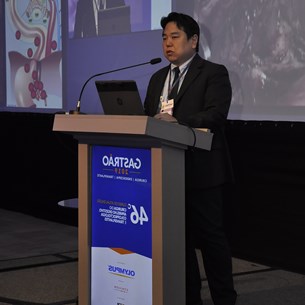Meeting
2018 Gastrointestinal Cancers Symposium

Instituto do Cancer do Estado de São Paulo, São Paulo, BR
Flavio Roberto Takeda , Ivan Cecconello , Ulysses Ribeiro , Rubens Antonio Aissar Sallum
Background: The surgical treatment of adenocarcinoma of the esophagogastric junction surgical treatment (AGEJ) is still controversial, particularly concerning to survival and postoperative complications. To compare thoracoscopic esophagectomy (group A) with transhiatal esophagectomy (group B) in patients with AGEJ in relation to the occurrence of complications and mortality; number of ressected lymph nodes, the positive and the ratio between the ressected and positive; overall and disease free survival; and survival after relapse. Methods: There was a selection of 147 patients from 2000 to 2017. Epidemiological data were analyzed and compared between the groups. Postoperative complications were evaluated. The anatomopathological staging was evaluated, analyzing the resected lymph nodes. Analysis of overall survival, disease free survival and survival after relapse were made, besides multivariate analysis of survival related factors. Results: In relation to the complications, group A presented greater occurrence of hoarseness and surgical infections. In relation to mortality, group A presented 2 cases (3.7%) and group B presented 4 (4.3%), without statistical difference. In group A, the average number of ressected lymph nodes was 31.88 and in group B was 20.73 (p < 0.001), however the average number of affected lymph nodes was 3.96 in group A and 4.25 in group B. The general overall survival was 42.3%, in group A was 38.9% and in group B was 47.6% (p = 0.298). In the multivariate analysis of overall survival only lymphatic invasion (p = 0.005), diabetes mellitus (p = 0.038) and surgical infection (p-0.001) were significant. However, in tumors with stage until 2B, group A overall survival was 80.4% and group B was 38.5% (p = 0.001). Conclusions: Both methods are safe with similar morbidity and mortality rates. Transthoracic thoracoscopic esophagectomy allows a larger ressection in the number of lymph nodes. Overall survival and disease free survival are similar, however until stage 2B thoracoscopic esophagectomy improves overall survival. Diabetes and lymphatic invasion interfere in overall and disease free survival.
Disclaimer
This material on this page is ©2024 American Society of Clinical Oncology, all rights reserved. Licensing available upon request. For more information, please contact licensing@asco.org
2018 Gastrointestinal Cancers Symposium
Poster Session
Poster Session A: Cancers of the Esophagus and Stomach
Cancers of the Esophagus and Stomach
Multidisciplinary Treatment
J Clin Oncol 36, 2018 (suppl 4S; abstr 185)
10.1200/JCO.2018.36.4_suppl.185
185
L23
Abstract Disclosures
2023 ASCO Gastrointestinal Cancers Symposium
First Author: Oguzhan Alagoz
2024 ASCO Annual Meeting
First Author: Samia Asif
2023 ASCO Annual Meeting
First Author: Michael Untch
2023 ASCO Annual Meeting
First Author: Jhanelle Elaine Gray